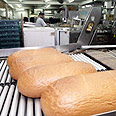
Price of supervised white and dark bread to drop to NIS 5.07
צילום: שאול גולן
Bread prices to be reduced by 4.17%
Economy Minister Naftali Bennett signs order to drop government-supervised bread prices following reduction in wheat, oil prices. Move expected to take effect in coming days
Bread prices in Israel are expected to drop in the coming days for the first time since March 2009.
Economy Minister Naftali Bennett signed an order validating a decision made by the Pricing Committee, which includes representatives from the Finance Ministry and Economy Ministry (formerly the Industry, Trade and Labor Ministry). The order calls for a reduction of 4.17% in the prices of government-supervised bread.
The order is expected to take effect in the coming days, after Finance Minister Yair Lapid adds his signature, after bakeries affected by the decision get the right to respond and after an official statement is released to the press.
According to the new price chart, the price of white and dark bread will be reduced by NIS 0.22 (about $0.06) from NIS 5.22 to NIS 5.07 ($1.44 to $1.4), the price of sliced bread will drop from NIS 7.93 to NIS 7.6 ($2.19 to $2.1) and the price of challah will go down from NIS 5.77 to NIS 5.53 ($1.6 to $1.53).
Sources in the Economy Ministry noted that the reduction was the result of an ongoing drop in global wheat prices and oil prices, which affect the cost of the transportation of goods.
In addition, the appreciation of the shekel in recent months has led to a reduction in the prices of all imported products.
The sources added that the ministry would soon conduct a reexamination of the bread supervision policy, and will consider applying different supervised prices in different parts of the country.
Sources involved in the price supervision have been bothered for quite a while now by the fact that in some areas in Israel supervised products are being sold for a lower price than the supervised price. This mostly happens in stores of large chains located in the centers of Israel's main cities.
Government officials believe that in areas with high competition, chain owners are asked by manufacturers to pay lower prices for supervised products in return for purchasing other product.
In addition, the huge purchasing power of the major chains in crowded populated areas create a reality in which the cost of a supervised loaf of bread in a large supermarket chain in central Israel is lower than the cost of a supervised loaf of bread in a grocery store in the periphery.
'Important message to business sector'
Itzik Alrov, who initiated the cottage cheese boycott in 2011 and founded a consumers' movement, welcomed the move.
"Beyond the money each citizen will be saving, we see here an important message here to the business sector: There is no reason for prices to only go up. When the prices of global goods and raw materials are declining, prices must be reduced for the small consumer as well, and the gaps should not be used only to increase tycoons' fortune."
Alrov added, "We call on food manufacturers and on supermarket chains to respond to public sentiments and reduce the prices of their products as well."










